

Operant Conditioning. How Reinforcement and Punishment Modify Behavior Operant conditioning, also known as instrumental conditioning, is a method of learning normally attributed to B.F. Skinner, where the consequences of a response determine the probability of it being repeated. Operant conditioning. Untitled. Reinforcement vs. Punishment: Changing BehaviorBehavioral Health Works. Being a parent has been known as the best thing ever BUT also the most challenging endeavor you will encounter in your lifetime.
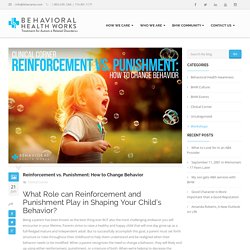
Parents strive to raise a healthy and happy child that will one day grow up as a full-fledged mature and independent adult. Developmental Psychology at Vanderbilt. Jacob Lee and Matthew Snodgress There is no one individual who influences the development of a child more than the parent.
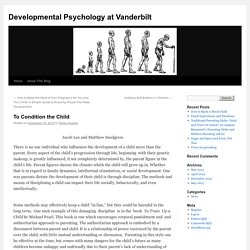
Every aspect of the child’s progression through life, beginning with their genetic makeup, is greatly influenced, if not completely determined by, the parent figure in the child’s life. Parent figures choose the climate which the child will grow up in. Whether that is in regard to family dynamics, intellectual stimulation, or social development. One way parents dictate the development of their child is through discipline. The Use of Reinforcement and Punishment in Shaping a Child's Behavior. How do parents discipline their teenagers then? Teens May Learn Best with Positive Reinforcement. A new study finds that adolescents focus on rewards and are less able to learn to avoid punishment or consider the consequences of alternative actions.

University College-London investigators compared how adolescents and adults learn to make choices based on the available information. Investigators tracked the way in which 18 volunteers aged 12-17 and 20 volunteers aged 18-32 completed tasks in which they had to choose between abstract symbols. Each symbol was consistently associated with a fixed chance of a reward, punishment, or no outcome. As the trial progressed, participants learned which symbols were likely to lead to each outcome and adjusted their choices accordingly. Adolescents and adults were equally good at learning to choose symbols associated with reward, but adolescents were less good at avoiding symbols associated with punishment. The study appears in PLOS Computational Biology. Rewarding behavior is key to parenting teens, study suggests. Parenting is hard, and parenting teens brings about an entirely new set of challenges, from keeping their rooms clean to getting them home before curfew.

But, a new study suggests parents who want their teenagers to keep their grades up could have better success if they focus more on rewarding good behavior and less on threatening to punish the bad. According to the report, published in PLOS Computational Biology, British researchers have found that adolescents focus well on positive incentives, but have difficulty staying motivated to avoid penalties. The study shows that teens and adults learn in different ways, according to the study’s lead author Stefano Palminteri, a researcher with the Institute of Cognitive Neuroscience at University College London. It suggests that “in some cases positive feedback may have more of an effect than negative feedback on learning” in adolescents. Beyond Discipline for Preteens. "What kind of discipline works for preteens?

What I was doing before (consequences) certainly doesn't work any more. Positive Punishment in Psychology: Definition + 12 Examples. A Parent's Guide to Surviving the Teen Years. You've lived through 2 a.m. feedings, toddler temper tantrums, and the back-to-school blues.
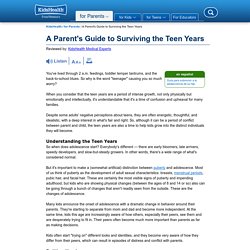
So why is the word "teenager" causing you so much worry? When you consider that the teen years are a period of intense growth, not only physically but emotionally and intellectually, it's understandable that it's a time of confusion and upheaval for many families. Despite some adults' negative perceptions about teens, they are often energetic, thoughtful, and idealistic, with a deep interest in what's fair and right. So, although it can be a period of conflict between parent and child, the teen years are also a time to help kids grow into the distinct individuals they will become. Understanding the Teen Years. Discipline strategies for teenagers. Around the time that your child starts secondary school, you might need to adjust your approach to discipline.
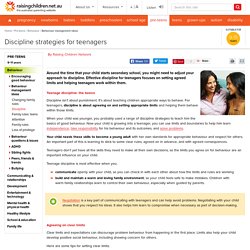
Effective discipline for teenagers focuses on setting agreed limits and helping teenagers work within them. Teenage discipline: the basics Discipline isn’t about punishment. It’s about teaching children appropriate ways to behave. Tips for Communicating With Your Teen. The teenage years have a lot in common with the terrible twos.
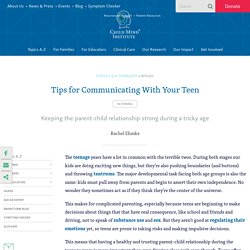
During both stages our kids are doing exciting new things, but they’re also pushing boundaries (and buttons) and throwing tantrums. The major developmental task facing both age groups is also the same: kids must pull away from parents and begin to assert their own independence. No wonder they sometimes act as if they think they’re the center of the universe. The Parenting Mistake That Makes Teens Push You Away. ParentingYourTeen Handout1.